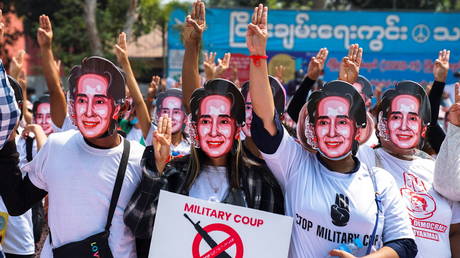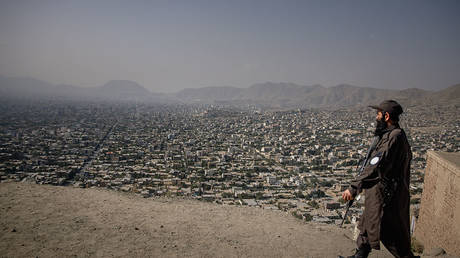
A Myanmar court has slapped the country’s ousted civilian leader Aung San Suu Kyi with additional charges, as mass-protests against the military coup that toppled her refuse to die down, even after a deadly weekend.
The ousted politician appeared before the court via videolink on Monday, and was seen in public for the first time since the February 1 coup.
Suu Kyi was slapped with two additional charges, one stemming from the colonial-era penal code over alleged publication of information that may “cause fear or alarm” or disrupt “public tranquility.” The other one was brought under a telecommunications law stipulating licenses for equipment.
Earlier, Suu Kyi had been accused of illegally smuggling six walkie-talkies into the country, and of violating a natural-disaster law by breaching coronavirus rules. The politician’s supporters believe the charges have been made up.
Protests in her support and against the actions of the military are still rampant across the country. In the largest city, Yangon, police have reportedly used tear gas and stun grenades to disperse the crowds.
The court hearings follow a weekend of violent police crackdowns on protesters, with law enforcement widely using stun grenades, gas and live fire against the crowds. Sunday turned out to be the bloodiest day of the month-long unrest, with at least 18 people killed.
The violence has already been condemned by the UN human rights office, which urged world leaders to act and put pressure on Myanmar’s military to stop the bloodshed.
“Police and military forces have confronted peaceful demonstrations, using lethal force and less-than-lethal force that – according to credible information… has left at least 18 people dead and over 30 wounded,” the human rights office said in a statement.
Myanmar was plunged into chaos a month ago, when the country’s military seized power accusing Suu Kyi and her ruling party of having grossly falsified the November elections. The coup ended a nine-year period of civilian rule in the county, which has been controlled by the military from the early 1960s until 2011.
Suu Kyi and her fellow party leaders have been detained, while the military has imposed a state of emergency that, it says, will remain in place for one year. The coup triggered mass protests across the country, with thousands demanding the release of the detained politicians and a return to civilian rule.
Think your friends would be interested? Share this story!




